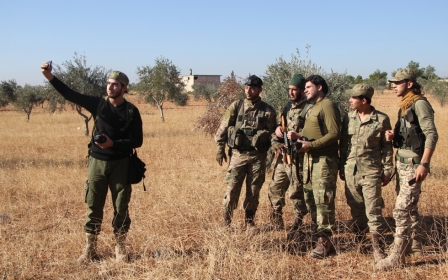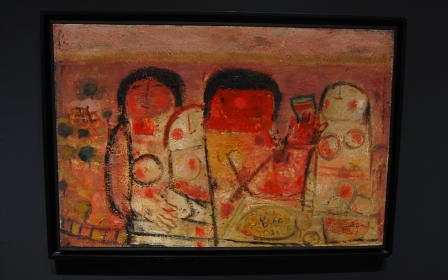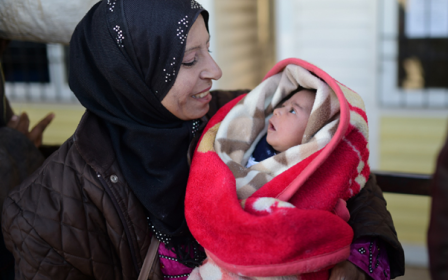US-backed Syrian forces announce start of campaign against Raqqa
A US-backed Kurdish-Arab alliance launched an offensive Sunday on the Islamic State (IS) group's de facto Syrian capital Raqqa, increasing pressure on the militant group after Iraqi forces entered their Iraqi stronghold, Mosul.
"The major battle to liberate Raqqa and its surroundings has begun," Jihan Sheikh Ahmed, a spokeswoman for the Syrian Democratic Forces (SDF) said at a press conference in Ain Issa, about 50km north of Raqqa.
The operation, dubbed "The Wrath of the Euphrates," involves some 30,000 fighters and had begun on Saturday night, Ahmed said.
"Raqqa will be liberated with the aid of its people, be it Kurds, Arabs, or Turkmen, the heroes comprised under the flag of SDF."
She said the SDF was "calling on humanitarian organisations to undertake their humanitarian duty" towards the people of Raqqa.
SDF spokesman Talal Sello told AFP the operation would proceed in two phases, first seizing areas around Raqqa and isolating the city, then "taking control of the city" itself.
"The fight will not be easy and will require accurate and careful operations because IS will defend its bastion knowing that the loss of Raqqa will mean it is finished in Syria," he said.
An AFP correspondent in Ain Issa saw dozens of armed SDF fighters on vehicles heading towards the frontline.
The long-awaited operation comes two years after IS seized control of large parts of Syria and Iraq.
The militants have suffered a string of territorial defeats in recent months and are under pressure on multiple fronts.
After launching an offensive on Mosul on 17 October, Iraqi special forces pushed into the city on Friday and have been facing stiff resistance from IS.
Complicated battlefield
The loss of Mosul and Raqqa would deprive IS of its largest population centres, undermining the group's claim to a self-declared "state".
But capturing the two cities, both still home to large civilian populations, is expected to be a lengthy, and likely bloody, process.
Driving the militants from their urban strongholds has been the end-game since a US-led coalition launched air strikes against IS in the summer of 2014.
The coalition has also provided training and deployed hundreds of advisers to work with Iraqi forces and select Syrian fighters, including the SDF.
Sello said the alliance had received new weapons from the coalition for the Raqqa battle, including anti-tank missiles.
Shortly after visiting Iraq last month to check on the Mosul offensive, US Defence Secretary Ashton Carter said that an assault on Raqqa would take place "within weeks".
The idea of simultaneous operations against Mosul and Raqqa "has been part of our planning for quite a while," he said.
France also said on Sunday the US-led coalition fighting IS should begin the battle on Raqqa while the offensive on Mosul is underway, Defence Minister Jean-Yves Le Drian said.
"I believe it will be necessary," he told Europe 1 radio.
Le Drian, whose country is the second-biggest contributor to the coalition, added that the battle on Mosul would be long and complicated given that Islamic State was embedding itself within the local population.
But in Raqqa the battlefront is far more complicated.
After five years of civil war, Syria is divided into a patchwork of fiefdoms, with President Bashar al-Assad's government, IS and a range of opposition forces all holding territory.
Carter singled out the SDF as the coalition's potential ground partner in the Raqqa offensive, and last week the alliance said it would be leading the assault.
Dominated by the powerful Kurdish People's Protection Units (YPG), the SDF has in recent months flushed IS out of swaths of territory in northern Syria, including the flashpoint town of Manbij in August.
Scene of worst atrocities
Washington has promoted the SDF as a key ally in the fight against IS, but the alliance is complicated by Turkey's fierce opposition to the YPG.
Ankara considers the militia a terrorist group, and in August launched its own operation inside northern Syria, targeting both IS and the YPG.
Sello said on Sunday that the SDF had "agreed definitively" with the United States "that there will be no role for Turkey or the armed factions allied with it in the operation" to capture Raqqa.
However, on Sunday the chief of general staff of the Turkish Armed Forces met with his US counterpart in Ankara on Sunday on the request of the US military, the Turkish armed forces said in a statement.
No details were given about the meeting between Hulusi Akar and Joseph Dunford.
Turkish-backed forces in northern Syria aim to push Islamic State militants further south from the town al-Bab and are currently 12 or 13 km from the town, Turkish President Tayyip Erdogan said on Sunday.
Raqqa, in northern Syria on the Euphrates River, was home to about 240,000 residents before 2011, and more than 80,000 people have fled there from other parts of the war-torn country.
It was the first provincial capital to fall from government control when rebels captured it in March 2013, two years after an uprising against Assad began.
IS drove out the rebels in January 2014 and five months later declared its self-styled Islamic "caliphate" in Syria and Iraq.
Raqqa became the scene of some of IS's worst atrocities, from stonings and beheadings to the trading of sex slaves.
Thousands of foreign fighters flocked to Raqqa to join IS, and US officials have described it as the nerve centre for the group's attacks abroad.
Middle East Eye propose une couverture et une analyse indépendantes et incomparables du Moyen-Orient, de l’Afrique du Nord et d’autres régions du monde. Pour en savoir plus sur la reprise de ce contenu et les frais qui s’appliquent, veuillez remplir ce formulaire [en anglais]. Pour en savoir plus sur MEE, cliquez ici [en anglais].




